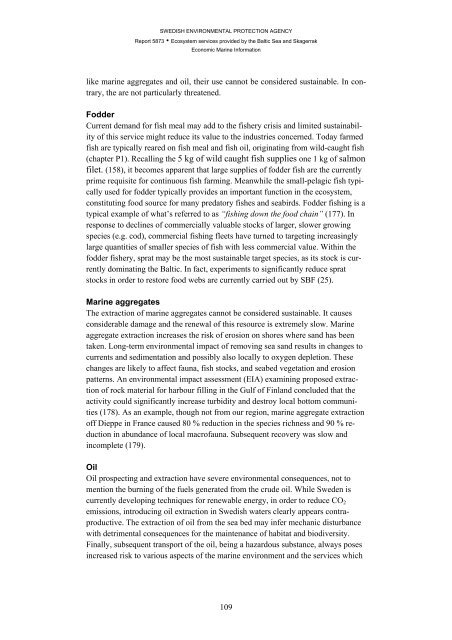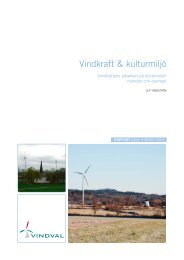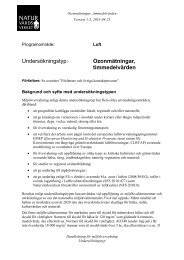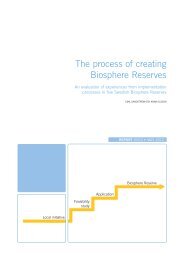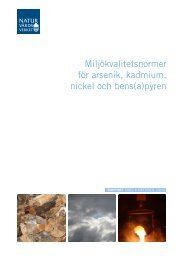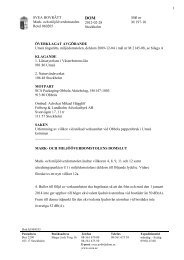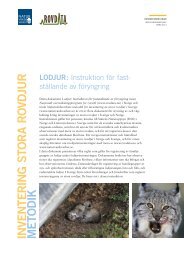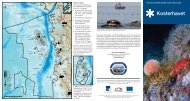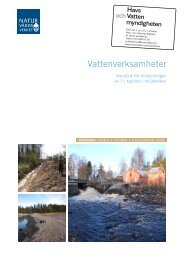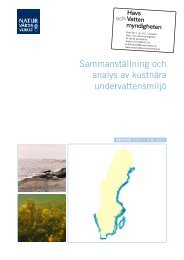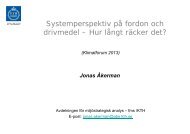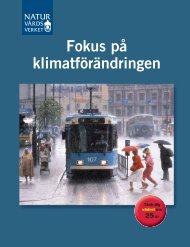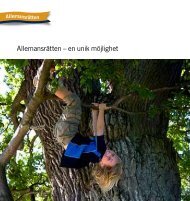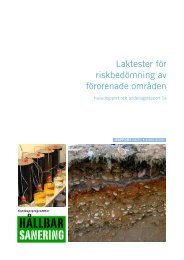Ecosystem services provided by the Baltic Sea ... - Naturvårdsverket
Ecosystem services provided by the Baltic Sea ... - Naturvårdsverket
Ecosystem services provided by the Baltic Sea ... - Naturvårdsverket
You also want an ePaper? Increase the reach of your titles
YUMPU automatically turns print PDFs into web optimized ePapers that Google loves.
SWEDISH ENVIRONMENTAL PROTECTION AGENCY<br />
Report 5873 • <strong>Ecosystem</strong> <strong>services</strong> <strong>provided</strong> <strong>by</strong> <strong>the</strong> <strong>Baltic</strong> <strong>Sea</strong> and Skagerrak<br />
Economic Marine Information<br />
like marine aggregates and oil, <strong>the</strong>ir use cannot be considered sustainable. In contrary,<br />
<strong>the</strong> are not particularly threatened.<br />
Fodder<br />
Current demand for fish meal may add to <strong>the</strong> fishery crisis and limited sustainability<br />
of this service might reduce its value to <strong>the</strong> industries concerned. Today farmed<br />
fish are typically reared on fish meal and fish oil, originating from wild-caught fish<br />
(chapter P1). Recalling <strong>the</strong> 5 kg of wild caught fish supplies one 1 kg of salmon<br />
filet. (158), it becomes apparent that large supplies of fodder fish are <strong>the</strong> currently<br />
prime requisite for continuous fish farming. Meanwhile <strong>the</strong> small-pelagic fish typically<br />
used for fodder typically provides an important function in <strong>the</strong> ecosystem,<br />
constituting food source for many predatory fishes and seabirds. Fodder fishing is a<br />
typical example of what’s referred to as “fishing down <strong>the</strong> food chain” (177). In<br />
response to declines of commercially valuable stocks of larger, slower growing<br />
species (e.g. cod), commercial fishing fleets have turned to targeting increasingly<br />
large quantities of smaller species of fish with less commercial value. Within <strong>the</strong><br />
fodder fishery, sprat may be <strong>the</strong> most sustainable target species, as its stock is currently<br />
dominating <strong>the</strong> <strong>Baltic</strong>. In fact, experiments to significantly reduce sprat<br />
stocks in order to restore food webs are currently carried out <strong>by</strong> SBF (25).<br />
Marine aggregates<br />
The extraction of marine aggregates cannot be considered sustainable. It causes<br />
considerable damage and <strong>the</strong> renewal of this resource is extremely slow. Marine<br />
aggregate extraction increases <strong>the</strong> risk of erosion on shores where sand has been<br />
taken. Long-term environmental impact of removing sea sand results in changes to<br />
currents and sedimentation and possibly also locally to oxygen depletion. These<br />
changes are likely to affect fauna, fish stocks, and seabed vegetation and erosion<br />
patterns. An environmental impact assessment (EIA) examining proposed extraction<br />
of rock material for harbour filling in <strong>the</strong> Gulf of Finland concluded that <strong>the</strong><br />
activity could significantly increase turbidity and destroy local bottom communities<br />
(178). As an example, though not from our region, marine aggregate extraction<br />
off Dieppe in France caused 80 % reduction in <strong>the</strong> species richness and 90 % reduction<br />
in abundance of local macrofauna. Subsequent recovery was slow and<br />
incomplete (179).<br />
Oil<br />
Oil prospecting and extraction have severe environmental consequences, not to<br />
mention <strong>the</strong> burning of <strong>the</strong> fuels generated from <strong>the</strong> crude oil. While Sweden is<br />
currently developing techniques for renewable energy, in order to reduce CO 2<br />
emissions, introducing oil extraction in Swedish waters clearly appears contraproductive.<br />
The extraction of oil from <strong>the</strong> sea bed may infer mechanic disturbance<br />
with detrimental consequences for <strong>the</strong> maintenance of habitat and biodiversity.<br />
Finally, subsequent transport of <strong>the</strong> oil, being a hazardous substance, always poses<br />
increased risk to various aspects of <strong>the</strong> marine environment and <strong>the</strong> <strong>services</strong> which<br />
109


